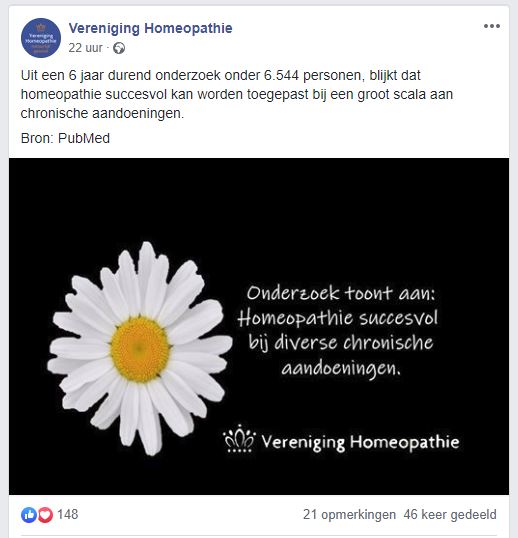De Vereniging Homeopathie deelde enthousiast het volgende plaatje op haar Facebook-pagina (*):
Tjongejonge, “een 6 jaar durend onderzoek onder 6.544 personen” en het staat in PubMed! Nou dan moet het wel OK zijn, toch? Beetje jammer dat ze er niet even een linkje naar het onderzoek zelf bij zetten, maar dat hebben we ze zelf natuurlijk zo gevonden. Het moet haast wel om dit onderzoek gaan:
The Journal of Alternative and Complementary Medicine. Nov 2005. (PubMed link)
Het artikel (uit 2005!) kon ik helaas niet in geheel vinden [inmiddels wel, zie naschrift], dus moeten we het maar even met de samenvatting doen:
Abstract
OBJECTIVE:
The aim of this study was to assess health changes seen in routine homeopathic care for patients with a wide range of chronic conditions who were referred to a hospital outpatient department.DESIGN:
This was an observational study of 6544 consecutive follow-up patients during a 6-year period.SETTING:
Hospital outpatient unit within an acute National Health Service (NHS) Teaching Trust in the United Kingdom.PARTICIPANTS:
Every patient attending the hospital outpatient unit for a follow-up appointment over the study period was included, commencing with their first follow-up attendance.MAIN OUTCOME MEASURE:
Outcomes were based on scores on a 7-point Likert-type scale at the end of the consultation and were assessed as overall outcomes compared to the initial baseline assessments.RESULTS:
A total of 6544 consecutive follow-up patients were given outcome scores. Of the patients 70.7% (n = 4627) reported positive health changes, with 50.7% (n = 3318) recording their improvement as better (+2) or much better (+3).CONCLUSIONS:
Homeopathic intervention offered positive health changes to a substantial proportion of a large cohort of patients with a wide range of chronic diseases. Additional observational research, including studies using different designs, is necessary for further research development in homeopathy.
Het is dus niet meer dan een soort klanttevredenheidsonderzoek. Er is geen controlegroep en de uitkomsten berusten op zelfrapportages op een 7-punts schaal. Ook deden er alleen patiënten mee die bij minstens één vervolgafspraak kwamen opdagen. Patiënten die na een eerste consult zo ontevreden waren (of net op tijd doorkregen wat voor onzin homeopathie eigenlijk is) en wijzer geworden een mogelijk geplande vervolgafspraak lieten schieten, zitten er dus niet bij.
Dat de patiënten die bleven komen best tevreden waren en de homeopathische behandelaars een dikke voldoende gaven voor de behandeling van hun chronische aandoening is dus niet zo verrassend. Zeker als we nog bedenken dat het vaak ging om klachten die soms opspelen en daarna weer afnemen. Waarschijnlijk is bij het eerste consult sprake van een verhoogde last, die vanzelf al zou verminderen, ook zonder homeopathische korreltjes (“regression to the mean“).
O ja, het Bristol Homeopathic Hospital waar dit onderzoekje uitgevoerd werd, is in 2015 opgeheven...
Naschrift
De studie inmiddels gevonden op de site van de bekende kwakzalverbestrijder David Colquhoun die in 2005 al een blog schreef over dit infamous paper. Kort citaat:
It is obvious that there is not the slightest reason to attribute the answers given by patients to the fact that they had been given homeopathic treatment. That would be the crudest form of post hoc ergo propter hoc error. It does not even show that the homeopathic treatment was producing a placebo effect.
Papers like this do not add to human knowledge, they detract from it. By reverting to pre-enlightment forms of argument, they mislead rather than enlighten. To make matters worse, this work was done at public expense, by the Directorate of Homeopathic Medicine, United Bristol Healthcare, National Health Service Trust, Bristol, United Kingdom.
Link naar een pdf van het artikel is te vinden onderaan dat blog.
* Update 27 mei 2019: het bericht is inmiddels van de Facebookpagina verdwenen …
